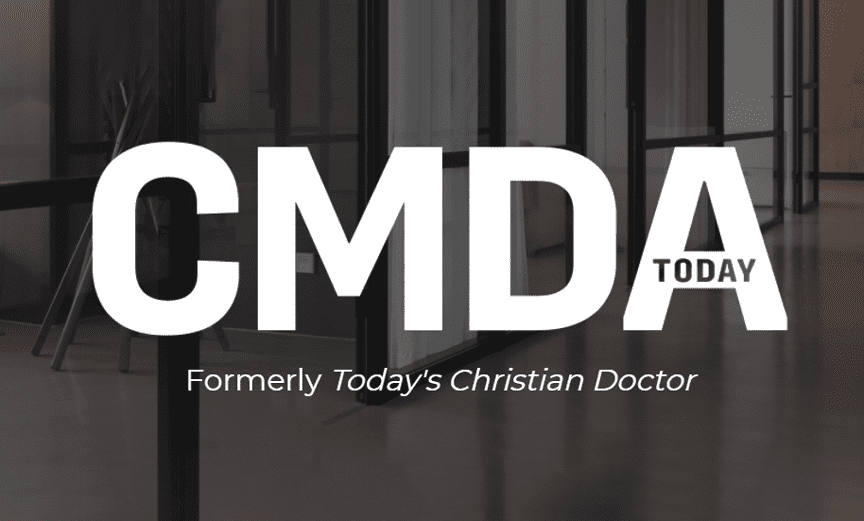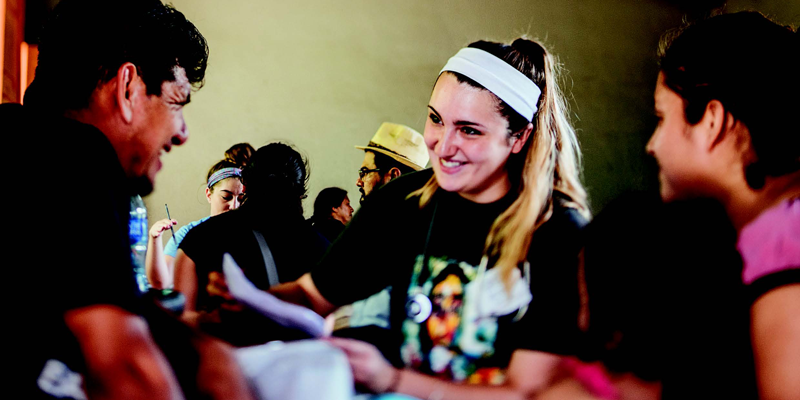
First Fruits and Capstone
The healthcare mission field stands at an important crossroads. Around the world, opportunities abound for fruitful ministry through healthcare missions. Healthcare professionals are desperately needed, and they can serve in places non-medical missionaries can’t serve. All too often, needs and opportunities go unmet. The doors will not remain open forever. As health systems around the world modernize, healthcare missions and missionaries become less necessary in the eyes of the host community, and the missionary’s witness and scope of influence are curtailed significantly.

The healthcare mission field stands at an important crossroads. Around the world, opportunities abound for fruitful ministry through healthcare missions. Healthcare professionals are desperately needed, and they can serve in places non-medical missionaries can’t serve. All too often, needs and opportunities go unmet. The doors will not remain open forever. As health systems around the world modernize, healthcare missions and missionaries become less necessary in the eyes of the host community, and the missionary’s witness and scope of influence are curtailed significantly.
Even so, as these opportunities cry out for workers, we are seeing alarming attrition in our healthcare mission workforce. There are myriad reasons for this. Certainly, the pandemic is a factor, leading some long-term workers to return earlier than planned, while others are deciding not to travel at all. However, understaffing at mission hospitals and unmet opportunities pre-dated the pandemic. Keeping this in mind, how can we as Western Christian healthcare professionals play a role in helping to meet the needs? As we acknowledge the skills God has entrusted to us, and we consider Jesus’ example and admonishment to care for the poor, marginalized and lost, how would He want us to live?
We consider these types of questions frequently at CMDA’s Center for Advancing Healthcare Missions (CAHM). Healthcare missions is integrated into the DNA of CMDA and our members. So how can we work together to step in and be a part of critical healthcare ministry happening both in our backyard and around the world? This is not a matter of putting out a “help wanted” sign to beg and plead with workers to fill remote and austere outposts by making them feel guilty. This is about creating open doors and clear glidepaths for Christian healthcare workers to be a part of moving God’s kingdom forward. It’s an effort that cannot and will not fail, as we rely on God’s provision. It’s an invitation to join the ultimate adventure. It may cost us everything, but there’s nothing more important to which we could give our time, treasure, talent and even our lives!
Stepping back a bit from this lofty agenda, the practical questions of who and how arise. Enter First Fruits and Capstone, our two mobilization sweet spots for healthcare personnel. While anyone can take first steps toward being involved in missions at any time, it is easier for some than for others. It would be more difficult, for example, for a 44-year-old mother of three with a busy practice, a mortgage, church and community commitments and college tuition looming to significantly engage in missions than some of her older or younger counterparts.
First Fruits engages students, trainees and early career healthcare workers. The concept of “first fruits” appears repeatedly in Scripture and applies practically to this stage in one’s life. This type of giving is distinct from a tithe in that it’s not just giving a set percentage to God. It’s a gift of faith, giving God our first and our best wealth, time and talents. When we step out in faith and give to God from our hearts, we are trusting Him with our future and believing His promises will come to us, because God is faithful to give when we give.
In Deuteronomy 26:1-3a, 9-11 we read:
“When you have entered the land the Lord your God is giving you as an inheritance and have taken possession of it and settled in it, take some of the firstfruits of all that you produce from the soil of the land the Lord your God is giving you and put them in a basket. Then go to the place the Lord your God will choose as a dwelling for his Name and say to the priest in office at the time…‘…He brought us to this place and gave us this land, a land flowing with milk and honey; and now I bring the firstfruits of the soil that you, Lord, have given me.’ Place the basket before the Lord your God and bow down before him. Then you and the Levites and the foreigners residing among you shall rejoice in all the good things the Lord your God has given to you and your household.”
The Israelites were not only to give their first fruits upon entering the promised land, but also to make a habit of it. Israel’s annual festivals included first fruits giving. Most notable among these was the Feast of Shavuot or Pentecost, also called the Festival of First Fruits, at which time Jewish families gave their initial harvest (or first fruits) of wheat, barley, figs, grapes, pomegranates, olive oil and dates. Oftentimes these offerings were loaded on to oxen carts, and the oxen were adorned with garlands as they traveled toward Jerusalem. Music and parades accompanied these carts as they made their way through villages. Giving these gifts was an act of joyous thanksgiving, not begrudging obligation.
We read about first fruits in Proverbs 3:9-10 as well: “Honor the Lord with your wealth, with the firstfruits of all your crops; then your barns will be filled to overflowing, and your vats will brim over with new wine.”
Our gifts should be given from our first and best, not from our leftovers. God wants the prime rib, not the leftover bone and gristle. When we find a warning about giving God less than our best, we are wise to heed it, as we see in the Scriptures below.
“Set apart for the Lord your God every firstborn male of your herds and flocks. Do not put the firstborn of your cows to work, and do not shear the firstborn of your sheep…If an animal has a defect, is lame or blind, or has any serious flaw, you must not sacrifice it to the Lord your God” (Deuteronomy 15:19-21).
“‘When you bring injured, lame or diseased animals and offer them as sacrifices, should I accept them from your hands?’ says the Lord. ‘Cursed is the cheat who has an acceptable male in his flock and vows to give it, but then sacrifices a blemished animal to the Lord. For I am a great king,’ says the Lord Almighty, ‘and my name is to be feared among the nations’” (Malachi 1:13-14).
So how does all this apply to the student, trainee or early career Christian healthcare worker? If this is your life circumstance, we would encourage you to commit to giving the first fruits of your career to God. He has entrusted you with an incredible set of skills. Begin your career with a mindset to give back to God. This establishes a practice that lines up with the reason most of us went into healthcare in the first place! The First Fruits initiative is not prescriptive, but rather it asks our younger colleagues to earnestly seek God as they transition from school and training to their first job. Perhaps He’s calling you into long-term foreign service. Perhaps it’s serial short-term trips for two months a year to teach residents at a facility in south Asia. Perhaps it’s working at a Christian Community Health Fellowship (CCHF) clinic here in the U.S. In giving your time and talent to God, you demonstrate your gratitude for your blessings and faith for God to continue to be your provider in the future.
It’s also worth noting that with more than 320 campus chapters at professional schools around the country, and our recently launched Horizons e-newsletter and ministry to undergraduates, CMDA is in a unique position to bring this First Fruits challenge to the next generation of Christian healthcare workers. We can’t wait to see what God has in store. We hope you’ll be a part of it!
On the other end of the career spectrum, Capstone looks to mobilize later career workers into healthcare missions. A number of healthcare professionals in their 50s and 60s find themselves with bandwidth they lacked in prior years to get involved. Might this be you? Perhaps your kids are grown, your debts are paid down and your clinical practice has some flexibility, but you still have tread on your tires. Perhaps you wonder how God might use you in a different way from your previous work in a clinic or hospital. Amazing opportunities exist to utilize your skills for kingdom purposes! While youth is celebrated and aging is not in the U.S., gray hair and balding heads are viewed as assets, not liabilities, in other parts of the world. Even if you’ve never been on a mission trip before, your clinical and life experience could truly be an incredible asset to communities and facilities in desperate need of healthcare professionals like you.
Might you be willing to give a few years to help get a residency established or strengthened in Africa? Could you do serial short-term trips to the same facility a few times each year to provide education to staff and a respite for the long-term missionaries who are there? Could you lead a Global Health Outreach team or join Medical Education International’s Advisory Council? Would you give 25 percent of your time to a Christian free clinic or crisis pregnancy center here in the U.S. instead of working at full tilt clinically until retirement, so you can max out your earnings? Would you consider shifting your goals and timeline to heed Jesus’ call to help the poor, the outcast, the marginalized and the lost? While participating in Capstone might require some adjustments, we read about different seasons of life in Ecclesiastes 3, and retirement is not one of them. As is the case with First Fruits, Capstone is not seeking to be prescriptive or one size fits all. Rather, it’s a challenge to CMDA members to commit themselves fully to kingdom work, perhaps in a different way than they did earlier in their careers.
If this article resonates, would you consider a next step? Pray and fast. Talk with your spouse or friend. Then visit www.cmda.org/cahm to indicate your interest. Doing so is not a promise or a commitment, but it will help us connect you with resources to further explore how God might be leading you in this area.
If you’re interested in learning more about opportunities to serve, would like to set up a Zoom meeting to talk about your options or have any questions, please reach out to [email protected]. We’d love to be a part of your First Fruits or Capstone journey!
Get Involved
CMDA’s Center for Advancing Healthcare Missions (CAHM) seeks to mobilize and support physicians, dentists, nurses, therapists and other health personnel to use their professional skills to help people encounter Jesus, here in the U.S. and around the world. For more information and to get involved, visit www.cmda.org/cahm. To get involved in the new First Fruits and Capstones initiatives, visit www.cmda.org/firstfruits and www.cmda.org/capstone.
About the Author
Doug Lindberg, MD, has served at CMDA as the Director for the Center for Advancing Healthcare Missions since 2020. He attended Loyola University, Chicago for medical school, completed a family medicine residency at Waukesha Family Practice Residency and then completed a one-year rural health fellowship at East Tennessee State University. The Lindbergs served in Nepal as missionaries from 2009 to 2013, and Doug served as the medical director at HDCS-TEAM Hospital in Dadeldhura. They returned to the U.S. in 2013 for what was intended to be a one-year furlough. However, a series of unexpected events, including his wife’s life-threatening cancer diagnosis followed by her miraculous healing, led them to relocate back to Wisconsin where they continue to reside. In addition to his work with CMDA, Doug works part-time clinically in urgent care. He and his wife Ruth are both family physicians, and they have two children, Maddie and James. He also enjoys running, hiking and coaching his son’s baseball team, and he serves as an elder at Elmbrook Church.










